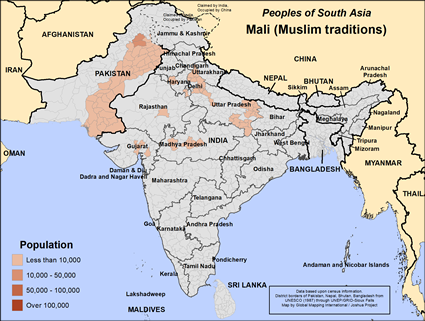Mali (Muslim traditions) in India

Send Joshua Project a photo
of this people group. |

Map Source:
People Group data: Omid. Map geography: UNESCO / GMI. Map Design: Joshua Project
|
| People Name: | Mali (Muslim traditions) |
| Country: | India |
| 10/40 Window: | Yes |
| Population: | 15,000 |
| World Population: | 93,000 |
| Primary Language: | Hindi |
| Primary Religion: | Islam |
| Christian Adherents: | 0.00 % |
| Evangelicals: | 0.00 % |
| Scripture: | Complete Bible |
| Ministry Resources: | Yes |
| Jesus Film: | Yes |
| Audio Recordings: | Yes |
| People Cluster: | South Asia Muslim - other |
| Affinity Bloc: | South Asian Peoples |
| Progress Level: |
|
Introduction / History
The Mali people of India are known as growers of flowers and vegetables. The vast majority of Mali is Hindu. A sizable minority converted to Islam during the eras of the Delhi Sultanate and Moghul Empire. Most of the Muslim Mali moved to Pakistan during the Partition of 1947. A smaller group remained in India. The Muslim Mali are part of the sudra or the fourth caste of laborers. Some claim to be Rajputs although they are seen as sudras by the higher castes. Flowers and garlands play a large part in Hindu life ceremonies especially weddings. Muslims do not make flowers a big part of their life ceremonies. As a result, many Muslim Mali grow vegetables, sugarcane and lentils along with flowers.
Though they are more numerous in Pakistan, the Muslim Mali community also lives throughout central India including the states of Uttar Pradesh, Uttarakhand and Rajasthan.
What Are Their Lives Like?
There is great variety in the lives of Muslim Mali. Educated Mali work in the professions while some Mali work as landless day laborers. Some Mali own the land they cultivate. Others work on the land own by other higher castes. Most Muslim Mali would fit into the Indian lower middle class.
Muslim Mali marry within their group, most of the time outside their clan. Families arrange marriages. Sons inherit property with the eldest son receiving the family home and father's title. Most boys go on to a secondary education while the girls only receive a primary education. Illiteracy is a problem among the Mali people, which hinders their economic advancement. A caste council settles legal disputes and promotes their interests. Muslim Mali do not eat pork but will eat other types of meat. Their staple foods are rice and vegetables.
What Are Their Beliefs?
Though most Mali people are Hindu, some are Sunni Muslim converts. Sunni Muslims believe that the one, Supreme God, Allah, spoke through his prophet, Mohammed, and taught mankind how to live a righteous life through the Koran and the Hadith. To live a righteous life, you must utter the Shahada (a statement of faith), pray five times a day facing Mecca, fast from sunup to sundown during the month of Ramadan, give alms to the poor, and make a pilgrimage to Mecca if you have the means. Muslims are prohibited from drinking alcohol, eating pork, gambling, stealing, slandering, and making idols. They gather for corporate prayer on Fridays at a mosque, their place of worship.
What Are Their Needs?
The Muslim Mali would benefit from access to modern medicine. Solar panels could help rural Mali. The children of Mali need to attend secondary schools, which lead to college. Agricultural experts could help the Mali with increased crop yields. Most of all, the Mali need to hear and respond to the message of Isa or Jesus. He alone can forgive their sin and get them right with the one, true God.
Prayer Points
Pray for workers to go to the Muslim Mali people, and for their hearts to be ready to receive their Savior.
Pray for networks of believing families and fellowships that will throw the doors open for others to follow Jesus.
Pray for the Lord to bless the families among the Mali people with His presence and mercy.
Pray for believers among this people group to disciple others who will disciple still others.